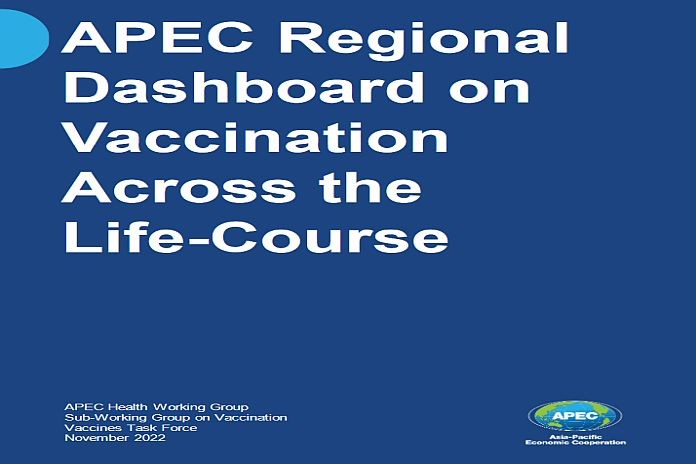By APEC Health Working Group
SINGAPORE – APEC member economies announced a comprehensive dashboard to help measure their collective progress towards implementing and advancing sustainable life-course immunization programs.
The APEC Regional Dashboard on Vaccination across the Life-Course builds on last year’s endorsed vaccine action plan which set strategies and policy targets for member economies to boost routine vaccination efforts, as well as enhance the resilience and sustainability of immunization programs in the region through 2030.
This initiative was undertaken by the APEC Vaccines Task Force under the purview of the APEC Health Working Group. The taskforce engages policymakers and private sector representatives to work on vaccine-related issues and to identify the best approach to immunization so member economies can better prevent infection and disease for all individuals.
Also read: APEC’s Vaccine Action Plan: Strengthening Immunization Programs in the Region
“Vaccination is one of the world’s most important and cost-effective public health measures,” said Dr Pongsadhorn Pokpermdee, chair of the APEC Health Working Group, who oversees the development of the dashboard.
“The COVID-19 virus is still here and while it is important for us to keep with our vaccine rollouts to protect people’s lives, we must not disregard the growing number of children at risk from devastating but preventable diseases,” Dr Pongsadhorn added.
According to the World Health Organization and the United Nations Children’s Fund, the world has recorded the largest sustained decline in childhood vaccinations in 30 years, with 25 million infants missing out on lifesaving vaccines.
A life-course approach to vaccination requires that immunization schedules and access to vaccinations respond to an individual’s stage in life, their lifestyle and specific vulnerabilities or risks to infectious disease that they may face.
By taking a life-course approach to immunization, APEC economies can better prevent infection and disease for all populations, fortify themselves against unforeseen challenges, improve economic and social inclusion and enable economic growth.
“The focus of this life-course approach is to maximize protection of populations across age groups and life circumstances,” said Dr Michelle McConnell, of the United States Department of Health and Human Services, the co-leading representative of the vaccination sub-group under APEC’s Health Working Group. “Despite the compelling case for investing in immunization, there remains insufficient investment in this component of health systems.”
The dashboard provides the instrument to achieve key objectives set by member economies for vaccination programs, such as establishing comprehensive immunization calendars and programs, as well as widening economies’ vaccine coverage for all populations, including foreign residents, migrant workers and refugees.
Learning from the pandemic, the dashboard also includes targets for economies to establish mechanisms to deliver vaccines during health emergencies and continue multisector collaboration within and across APEC economies to ensure a robust supply chain and access to vaccines across the globe.
“It is often said that you cannot manage what you do not measure,” said APEC secretariat executive director, Dr Rebecca Sta Maria. “This dashboard provides APEC economies with tools to assess our progress in driving health, social and economic impact of immunization programs.”
“We have seen how quickly economies came together to facilitate the development and distribution of COVID-19 vaccines, we must learn from this and replicate it for other essential vaccines to protect our people and the next generation,” Dr Sta Maria concluded.





